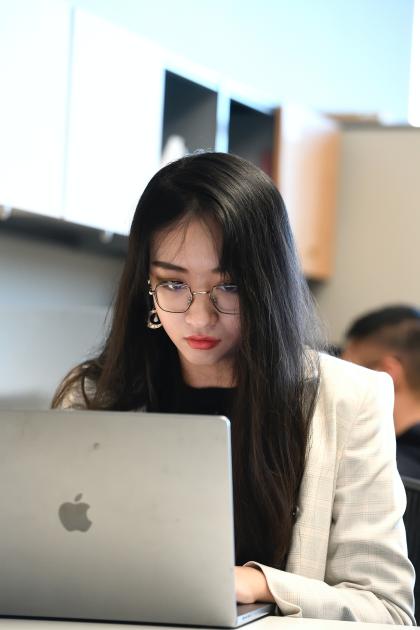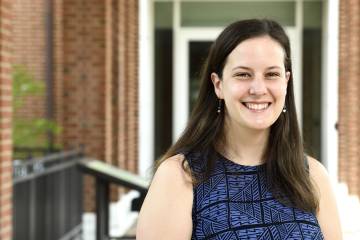Yutong Bai, a fourth-year computer science PhD student at Johns Hopkins Whiting School of Engineering, has been named a 2023 Apple Scholar in AI/ML—artificial intelligence and machine learning.
One of just 22 graduate students at universities around the world to be recognized by Apple Scholars in the AI/ML fellowship program this year, Bai was selected based on her "innovative research, record as a thought leader and collaborator in her field, and unique commitment to taking risks and pushing the envelope in machine learning and AI."
Bai works with the Computational Cognition, Vision, and Learning group under the direction of Bloomberg Distinguished Professor of Cognitive Science and Computer Science Alan Yuille.
Her doctoral research is focused on artificial computer vision systems. Computer vision allows robotic systems to see, process, and respond to their environment; for example, underwater robots recognizing objects on the ocean floor, or smart cars detecting traffic lanes and other vehicles.

Image credit: Will Kirk / Johns Hopkins University
In recent work, Bai has developed computer vision models based on self-supervised learning—a powerful method of pretraining AI models that is particularly useful for tasks that do not require labels, such as image recognition.
In traditional supervised learning, an image is paired with a label, such as "dog," and the model is trained to recognize this association. However, Bai's work focuses on training the model before using labeled data. During this pretraining phase, the model performs tasks that do not require human-labeled data. For example, the model may identify whether an image has been rotated, or breaks an image down into jigsaw-style pieces. By successfully completing these tasks, the model gathers fundamental knowledge that it can apply to other tasks.
The goal is to give AI systems a deeper understanding of reality beyond just what is specified in the training data.
"This is similar to how young children learn about the world around them. They may not know what an apple is, but they learn that objects can be placed near the mouth. When they are taught that an apple is an edible object, they quickly understand the concept because they have already built up a foundation of knowledge," says Bai. "By using self-supervised learning, models can acquire a similar foundation of knowledge and avoid making silly mistakes."
Additionally, Bai's research spans a variety of topics related to advancing what is known as explainable AI, a field that aims to gives designers and users a better understanding of why and how an AI system made its decisions.
"We want to understand the learning process, not just look at the results or output," she says. "For example, take large language models like ChatGPT. We see it has generated meaningful sentences, but we don't really know what it has learned. Is it generating fake information even though it sounds right?"
Her ultimate research goal is to build robust AI systems that require less supervision, bringing AI closer to human-level intelligence.
"We are now surrounded by AI in everyday life, so we need safer AI systems that users can trust in the real world. I can have a robot vacuum my floor or turn off my light for me. But there are so many more possibilities out there and that's why I'm interested in this research," Bai says.
She believes that being an Apple Scholar in AI/ML will allow her to pursue fresh research problems and make new connections.
"It gives me more freedom to explore high-risk, high-reward projects that I may not have been able to pursue otherwise. I'm also looking forward to expanding my collaborations with outside labs," Bai says.
Bai received a bachelor's degree from Northwestern Polytechnical University in Xi'an, China. Prior to joining Johns Hopkins, she interned at Google Brain and Meta AI.
Each Apple Scholar in AI/ML will receive support for their research and academic travel for two years, internship opportunities, and a two-year mentorship with an Apple researcher. Bai is the second Johns Hopkins graduate student to receive the recognition.
Posted in Science+Technology, Student Life
Tagged stem, artificial intelligence, machine learning, scholarships









